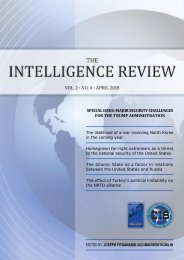The Intelligence Review | volume 4 | issue 7 |
The volume is the product of a transatlantic collaboration between the Chanticleer Intelligence Brief (CIB) and the European Intelligence Academy (EIA), a network of intelligence studies scholars, specialists and students, who are dedicated to promoting collaboration between Europe and the United States in intelligence scholarship and research. As always, the contents of this latest volume of The Intelligence Review are both timely and insightful. Analyst Ryan Lawrence examines a series of recent developments surrounding the Jalisco New Generation Cartel, which is arguably Mexico’s most powerful. Tyra Bjorlo discusses the highly overlooked issue of the rising importance of women in Salafi-jihadist groups, with particular reference to the Islamic State. Kyle Brossard focuses on the ongoing war against maritime piracy in the Indian Ocean and the Gulf of Guinea. Morgan Clasgens brings us up to speed on the current state of the Pakistani Taliban, and considers their future prospects. Audrey Oien evaluates the current and projected status of relations between Russia and China. Joseph Cain focuses on the National Liberation Army, a Colombia-based armed militant group with an increasing presence in Venezuela. And Madison Scholar considers the national-security implications of marijuana legalization in the United States.
The volume is the product of a transatlantic collaboration between the Chanticleer Intelligence Brief (CIB) and the European Intelligence Academy (EIA), a network of intelligence studies scholars, specialists and students, who are dedicated to promoting collaboration between Europe and the United States in intelligence scholarship and research. As always, the contents of this latest volume of The Intelligence Review are both timely and insightful. Analyst Ryan Lawrence examines a series of recent developments surrounding the Jalisco New Generation Cartel, which is arguably Mexico’s most powerful. Tyra Bjorlo discusses the highly overlooked issue of the rising importance of women in Salafi-jihadist groups, with particular reference to the Islamic State. Kyle Brossard focuses on the ongoing war against maritime piracy in the Indian Ocean and the Gulf of Guinea. Morgan Clasgens brings us up to speed on the current state of the Pakistani Taliban, and considers their future prospects. Audrey Oien evaluates the current and projected status of relations between Russia and China. Joseph Cain focuses on the National Liberation Army, a Colombia-based armed militant group with an increasing presence in Venezuela. And Madison Scholar considers the national-security implications of marijuana legalization in the United States.
You also want an ePaper? Increase the reach of your titles
YUMPU automatically turns print PDFs into web optimized ePapers that Google loves.
The uses of 21 st -century digital media innovations have
contributed to a shift in communication and recruitment
strategies (Nacos 2016). They also provide women and men
with an anonymous approach to joining Salafi-jihadist groups.
Digital media eliminates the risk of receiving criticism from
larger communities. For example, cultural courtesies, such as
looking into the eyes of one another or shaking hands, might
interfere with a foreign woman’s ability to communicate faceto-face
with a male militant. It also allows women to bypass the
need to travel to foreign countries, which was the only way to
connect with Salafi-jihadist groups prior to the dawn of digital
media, and increases the risk of being caught by authorities.
Women are indirectly lured into Salafi-jihadist groups through
the Internet via chat rooms and dating websites, as well as on
social media platforms like YouTube, Twitter, Facebook, and
WhatsApp. The data on this topic is inconclusive, but case
studies show that an increasing number of women who marry
male militants subsequently become directly involved in the
groups. Many of these women serve as the brains behind
organized attacks, head propaganda units, and partake in
combat operations (Mironova 2019).
Recent Developments
Many female jihadists were defiant when leaving the last Islamic
State of Iraq and Syria (ISIS) stronghold in the city of Baghouz
in northeastern Syria. The women were evacuated to a refugee
camp run by Kurdish-led Syrian Democratic Forces. When
interviewed by journalists, the women are typically angry and
persistent, vowing to continue fighting for Abu Bakr al-
Baghdadi (their self-proclaimed caliph prior to his death), in
hopes of re-establishing the Islamic caliphate. More specifically,
a BBC journalist, Jewan Abdi, was attacked with stones and
trash while some women shouted, “Go film the brothers, don’t
come here. Go. Leave. Go film them, we’re the women of the
Islamic State, Allahu Akbar, Allahu Akbar (God is greatest)”
(Abdi 2019). This indicates radicalization beyond defeat. IS
25

















